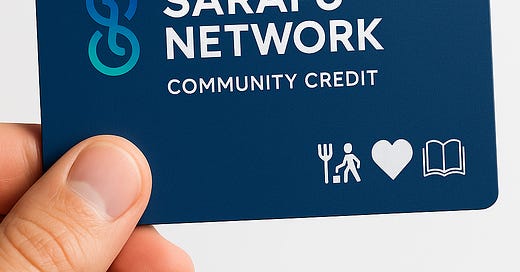What Credit Cards Can Teach Us
Simple, ancient protocols for community resilience and global trust
Most of us understand credit cards. You get access to something now—then pay later. But this basic idea… credit as trust .. isn't modern. It's ancient, and far more powerful than we often realize.
Let’s break it down.
Credit = Access Through Trust
A credit card lets you get groceries now, with repayment later.
Credit means access to value .. because someone trusts you’ll fulfill a promise.
Debt, then, is simply the other side: an outstanding commitment to give something back.
It’s about relationship-based coordination .. something communities have done forever.
Ancient Practices, Modern Clarity
Before credit cards, there were:
VSLAs rotating shared savings and loans
Labor circles taking turns on each other’s farms
Credit unions lending to members they know
Even the ancient Irish had a rule: you could borrow up to 3× what you contributed, based on collective trust. Fines and fees could as well be there to ensure people honor their commitments.
These weren’t financial products. They were agreements among people—to support one another, and to keep track.
What If the Pool Was Ours?
At Grassroots Economics, we work with systems of Commitment Pooling … a protocol for communities to coordinate real resources through shared promises.
Now imagine this: instead of a bank, your community creates a pool of resources.
Each person contributes what they can—labor, care, food, time—and issues a voucher for that promise.
These go into a Commitment Pool. Anyone in the group can borrow from the pool and later fulfill their own promise back into the system.
It’s like a credit card, but instead of owing money, you give back in service. The “collateral” is your reputation, and your care.
Turning Debt Into Something Useful
Normally, a lender just waits for repayment.
But what if your debt was backed by a service commitment someone else could use?
Say you promise to do carpentry. That promise is turned into a voucher, and the lender can find someone who needs carpentry to buy it. You fulfill your obligation to the lender, not in cash, but directly to who needs your services.
This is called multilateral clearing: the system balances itself by tracking commitments.
How Commitment Pooling Works
It’s a simple protocol of four core functions:
Curation – What kinds of promises can go in?
Valuation – What are they worth?
Limitation – How much can each person give or take?
Exchange – How are commitments fulfilled or transferred?
It works like a credit system built for people.
From Local Pools to a Global Credit Network
Now imagine not just one pool … but many, connected.
A VSLA in Kenya shares surplus with a group in Uganda.
A pool in a city federates with a rural network nearby.
Groups can recognize and redeem each other’s vouchers, forming bridges of trust.
Each pool remains local, but interlinks with others, like roots in a forest.
If one group faces a drought or emergency, others can step in. Trust flows where it's needed. This is a living network of relational credit, grounded in shared memory and mutual care.
Why It Matters
It’s ancient – rooted in how humans have always shared.
It’s resilient – it adapts to crisis and supports balance.
It’s practical – works even where cash doesn’t.
It’s equitable – value stays in the community network.
Commitment Pools don’t replace money (in fact money can be a pooled resource as well)… They make visible the deeper economy of trust that money often obscures.
Imagine…
You hold a credit card from your community.
You swipe it and gain access to:
A home-cooked meal
Help fixing your roof
A teacher for your child
Seeds, care, or labor when you need it most
And you repay with what you can offer.
That’s commitment pooling.
Debt with dignity….. credit with connection … transactions via trust.
And as these pools overlap and link, we begin to form something truly new and very old: A global network of commons-based credit, rooted in trust.
Welcome to the beginning of Sarafu.Network where you can make your own pools and give credit access today.




